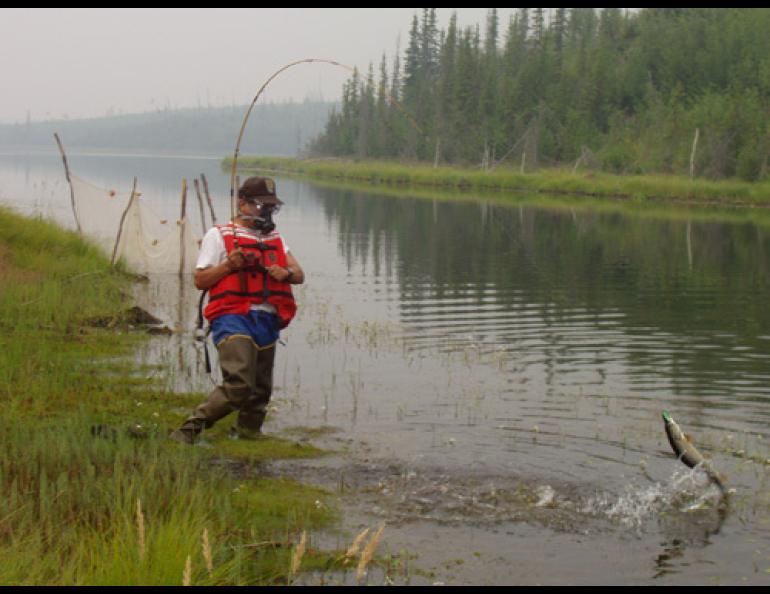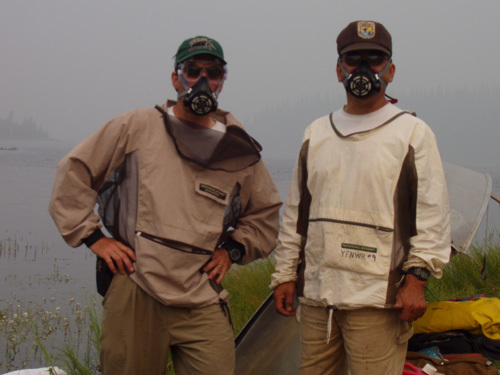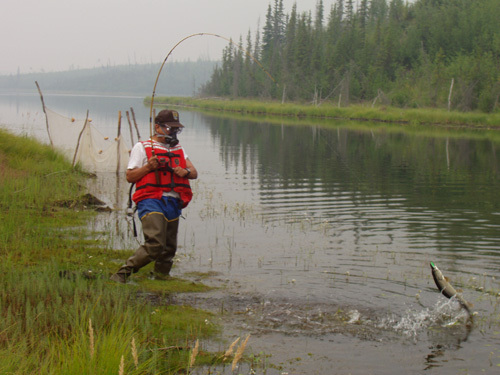

Smoked pike on menu for Yukon Flats scientists
People in Alaska’s interior inhaled more wildfire smoke than normal in summer of 2004. Mark Bertram and Jim Akaran ate more pike than normal, too.
Bertram and Akaran are biologists for the U.S. Fish and Wildlife Service who work for Yukon Flats National Wildlife Refuge in northern Alaska. During interior Alaska’s recent bout of thick smoke, they were stuck on a remote lake for nearly twice the time they had planned because smoke in Fairbanks was too thick for their pilot to retrieve them. Bad weather often prevents timely pick-ups and drop-offs in remote Alaska locations, but this was the first time either biologist had his rations stretched thin by smoke.
As of early August 2004, wildfires had burned more than 4.5 million acres of Alaska, and many fires were within or near Yukon Flats, a swath of lowlands larger than Vermont and Connecticut combined. Fires run through Yukon Flats each summer because it is one of the hottest areas in Alaska--the state’s all-time high of 100 degrees F occurred at Fort Yukon--and it receives a good share of the state’s lightning strikes. Bertram had never seen the area as smoky as mid July 2004, when a Cessna 206 on floats dropped off the researchers at Burman Lake.
“We skirted through quite a bit of smoke from the Boundary Fire as we passed over the White Mountains,” Bertram said. “It was about five miles visibility when we got to Burman.”
When time came for their Friday pickup, the biologists learned via their radiophone that Fairbanks was too smoky for the Cessna to take off. They waited and continued working, often wearing respirators that Akaran had picked up at a hardware store.
The smoke continued to hang over the lake no matter which way the wind blew.
“We were surrounded by fires,” Bertram said.
The biologists had eaten all their dinners by the third day that the plane was overdue, but luckily they were studying northern pike instead of rocks, and they caught a fat pike for dinner. In a moment of insight, Bertram remembered seeing a knife sticking from a cutbank near where they had pitched their tents. Left by a visiting fisherman years before, the knife’s handle had eroded but the three-inch stainless steel blade remained. Bertram sharpened it and used it to filet the pike because it was better suited to the task than the blade on his Leatherman.
On the ninth day of a trip they expected to last five days, Bertram and Akaran heard from Barry Whitehill, the refuge’s deputy manager who was more than one week overdue at Scoter Lake, a nearby camp west of Birch Creek village. Whitehill had contacted refuge headquarters in Fairbanks with his radiophone, and suggested they charter a floatplane from Bettles, a town to the northwest of Yukon Flats.
The plan worked. That evening, Whitehill, Bertram and Akaran all flew to Bettles, where they caught a commercial flight back to Fairbanks. There, they met relieved family members and ate dinners that didn’t consist of fish.







